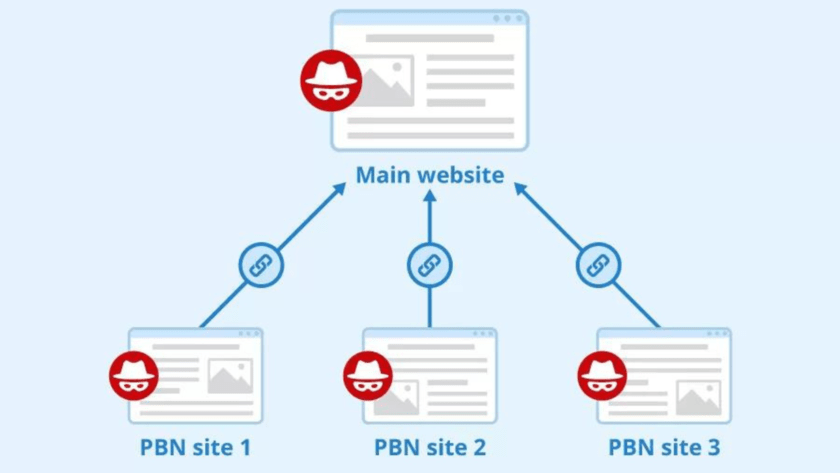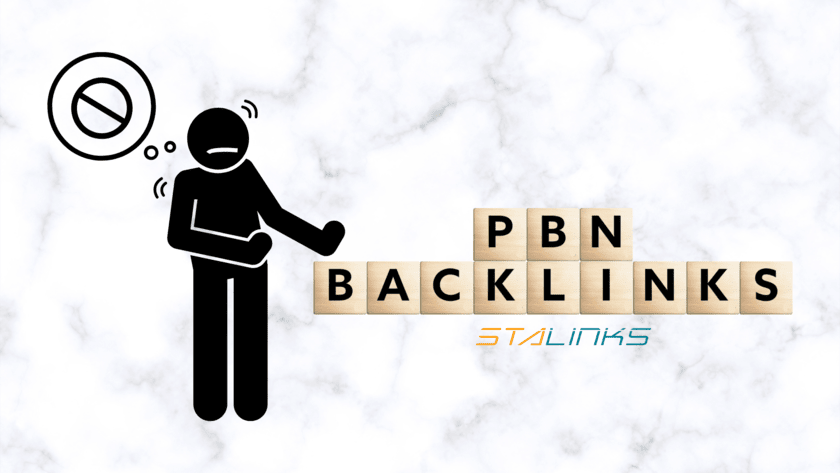Posted on September 21, 2023
In the ever-evolving landscape of search engine optimization (SEO), the term “PBN backlinks” has garnered significant attention and curiosity among digital marketers and website owners. While the allure of quick SEO gains is tempting, it is essential to understand the implications and risks associated with Private Blog Network (PBN) backlinks. In this informative article, we will delve deep into the world of PBN backlinks, shedding light on what they are, why they should be avoided, and ethical alternatives for sustainable SEO success.
What Are PBN Backlinks?
PBNs, or Private Blog Networks, are networks of websites created with the primary purpose of manipulating search engine rankings. These networks consist of multiple domains, often interconnected, and they are used to generate backlinks to a target website. These backlinks are designed to boost the target site’s authority and, in turn, its search engine rankings.
The process of setting up a PBN involves purchasing expired or auctioned domain names with existing authority, creating content on these domains, and interlinking them to establish a web of backlinks pointing to the target website. The idea behind PBNs is to create the illusion of organic, high-quality backlinks, ultimately tricking search engines into ranking the target site higher.
The Dark Side of PBN Backlinks
While PBNs may seem like a shortcut to SEO success, they come with a significant downside – they are considered black hat SEO tactics by search engines, particularly Google. Here are some compelling reasons why PBN backlinks should be avoided:
1. Google’s Stance on PBNs
Google’s algorithms are designed to reward websites that offer valuable, user-centric content and penalize those that engage in manipulative tactics. PBNs fall squarely into the latter category. Google has made its position on PBNs abundantly clear – they are against their guidelines, and websites found using them risk severe penalties.
2. Penalties for Using PBNs
If Google detects that a website is using PBN backlinks to manipulate its search engine rankings, it can impose various penalties, including deindexing the entire website. This means that the website will no longer appear in Google’s search results, rendering all SEO efforts futile.
3. Risks of Using PBNs for SEO
Beyond penalties, using PBNs poses several inherent risks, including:
- Lack of Control: PBNs are not immune to changes in the algorithmic landscape. Google’s constant updates can devalue PBN backlinks overnight, leaving your SEO strategy in shambles.
- Footprints: Google algorithms are adept at identifying patterns and footprints that PBNs leave behind. Once detected, the consequences can be severe.
- Reputation Damage: Using PBNs can tarnish your website’s reputation in the eyes of users and fellow webmasters, leading to a loss of trust and credibility.
Short-Term Gains vs. Long-Term Sustainability
One of the key attractions of PBNs is the promise of quick SEO wins. It’s true that, in the short term, PBNs can provide a boost in rankings. However, it’s crucial to weigh these short-term gains against the long-term sustainability of your SEO strategy.
The Quick Wins of PBNs
PBN backlinks can indeed lead to rapid improvements in search engine rankings. This immediate gratification can be enticing, especially for businesses seeking quick returns on their SEO investments.
The Impact on Long-Term SEO Strategy
However, the allure of quick wins often blinds website owners to the long-term consequences. PBNs are not a sustainable SEO strategy. They are a high-risk gamble that can lead to catastrophic losses when Google catches on. In the world of SEO, patience and ethical practices are key to long-term success.
Realistic SEO Expectations
The path to SEO success is not a sprint but a marathon. Building a robust online presence and a strong reputation in your niche takes time. Ethical SEO practices may require more effort initially, but they pay off in the long run by establishing trust and authority with both users and search engines.

PBN Backlinks and User Experience
Beyond the risks associated with search engine penalties, PBN backlinks can also negatively impact the user experience of your website.
Negative Impact on User Trust
When users discover that a website has been using manipulative tactics like PBNs to inflate its authority, trust is eroded. Users may question the credibility of the content and the legitimacy of the website’s offerings.
Impact on Website Reputation
Reputation is paramount in the online world. A tarnished reputation due to black hat tactics can be challenging to rebuild. It’s not just about rankings; it’s about how your audience perceives your brand.
Consequences for Brand Credibility
A damaged reputation can have far-reaching consequences for brand credibility. Negative associations with black hat SEO practices can persist long after you’ve abandoned them, hindering your business’s growth and success.
Black Hat vs. White Hat SEO
To fully appreciate the perils of PBNs, it’s essential to understand the distinction between black hat and white hat SEO practices.
Explanation of Black Hat and White Hat SEO
- Black Hat SEO: This encompasses tactics that aim to manipulate search engine rankings through deceptive, unethical means.
- White Hat SEO: This involves ethical, user-centric practices that aim to improve search engine rankings by providing high-quality content and value to users.
Why PBNs Are Considered Black Hat
PBNs fall squarely into the realm of black hat SEO. They involve deception, manipulation, and an intentional effort to game the system, all of which go against the principles of white hat SEO.
Ethical Alternatives to PBNs
It’s crucial to pivot away from black hat tactics like PBNs and embrace ethical alternatives that contribute to long-term SEO success. Here are some viable options:
- High-Quality Content Creation: Invest in creating valuable, informative, and engaging content that naturally attracts backlinks from reputable websites.
- Guest Posting: Collaborate with authoritative websites in your niche to publish guest posts that provide value to their audience.
- Natural Link Building: Focus on creating content that naturally earns backlinks through its quality and relevance.
- Building Relationships with Influencers: Establish relationships with influencers and thought leaders in your industry who can endorse your content and link to your website.
The Role of Quality Content in SEO
Quality content is the cornerstone of successful SEO. It not only attracts organic traffic but also encourages natural backlinks from authoritative sources.
The Significance of High-Quality Content
Quality content is not a mere accessory in SEO; it’s the foundation. Google and other search engines prioritize websites that consistently deliver valuable, well-researched, and user-friendly content.
Content That Attracts Natural Backlinks
When your content genuinely serves the needs and interests of your target audience, other websites in your niche are more likely to link to it organically. This natural link-building process is a hallmark of white hat SEO.
Content’s Influence on SEO Success
In the competitive online landscape, the quality of your content can be the differentiator that propels your website to the top of search engine rankings. Investing in content creation is a strategic move that pays off in the long run.
How to Detect PBN Backlinks
If you suspect that your website may have unwittingly acquired PBN backlinks or you want to safeguard against them, there are ways to detect their presence.
Tools for Identifying PBNs
Several online tools and software are designed to detect PBN backlinks and networks. Some popular options include Ahrefs, SEMrush, and Moz.
Warning Signs of PBN Backlinks
Certain red flags can indicate the presence of PBN backlinks, such as:
- Sudden and Unnatural Link Spikes: A sharp increase in backlinks within a short period is suspicious.
- Low-Quality and Irrelevant Websites: Links from websites with little authority and no relevance to your niche are suspect.
- Over-Optimized Anchor Text: Excessive use of exact-match anchor text in backlinks can signal manipulation.
Taking Action if You’ve Used PBNs
If you discover that your website has been benefiting from PBN backlinks, it’s essential to take corrective action immediately. This may involve disavowing such links, removing them, or adopting a transparent approach with search engines to rectify the situation.
A Forward-Looking SEO Strategy
To ensure the long-term success and sustainability of your online presence, it’s imperative to adopt an ethical and forward-looking SEO strategy.
The Need for Ethical and Sustainable SEO
Ethical SEO practices not only comply with search engine guidelines but also align with the best interests of your website’s users. Sustainability in SEO means continually adapting to algorithmic changes while staying true to ethical principles.
Building a Future-Proof SEO Strategy
A future-proof SEO strategy focuses on providing value, building trust, and establishing authority in your niche. It’s a proactive approach that anticipates algorithm updates and user trends.
Long-Term SEO Goals and Metrics
When planning your SEO strategy, consider long-term goals and metrics. Instead of quick wins, aim for steady growth in organic traffic, improved user engagement, and a strong online reputation.
SEO Trends and Updates
In the dynamic world of SEO, staying informed about search engine algorithm updates and industry trends is paramount.
Google Algorithm Updates
Google regularly rolls out algorithm updates to refine its search results. Staying abreast of these updates is crucial for adapting your SEO strategy.
Impact on PBNs
Algorithm updates often target manipulative practices like PBNs. Understanding how these updates affect your SEO efforts is essential for making informed decisions.
Staying Informed and Adapting
To succeed in SEO, ongoing education and adaptation are key. Joining industry forums, attending webinars, and following reputable SEO blogs can help you stay ahead of the curve.
Conclusion
In the world of SEO, shortcuts like PBN backlinks may seem tempting, but the risks far outweigh the benefits. Google’s algorithms are becoming increasingly sophisticated at detecting manipulative tactics, and the consequences for using PBNs can be dire.
To achieve lasting success in SEO, focus on ethical, white hat practices that prioritize user value, quality content, and transparency. Remember that SEO is a marathon, not a sprint. Building trust with users and search engines is the key to long-term sustainability and success in the digital landscape.

